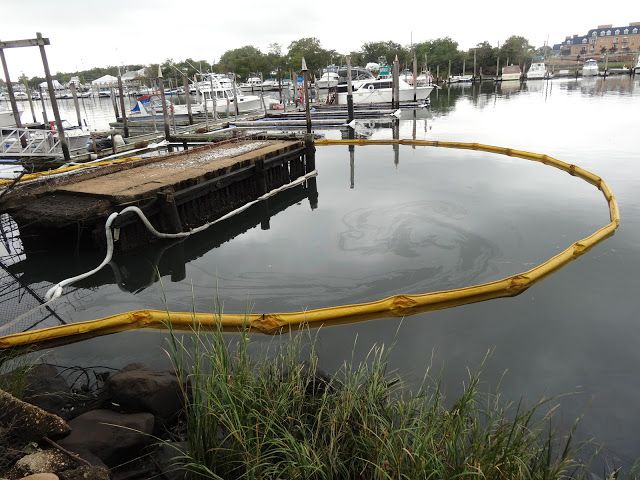National Grid Shares Details Of Paerdegat Basin Oil Spill

When we first broke the story about the Paerdegat Basin oil spill, in which an estimated 800 to 1,400 gallons of natural gas condensate, compressor oil and turbine oil poured into the waters near Jamaica Bay Wildlife Refuge, info was scarce. Representatives of the U.S. Coast Guard and Department of Environmental Conservation told us the spill had happened while an old pipe was being capped, but how the oil got into the water remained unclear. The company responsible for the spill, National Grid, did not respond to requests for comment.
National Grid has now weighed in, issuing a press release late last week that indicated the spill actually happened on land. Firefighters responding to complaints of a smell of natural gas in the neighborhood, created by the release of mercaptan, an additive that gives the gas its odor, arrived at the scene and flushed the oil and residue from the ground and into storm drains, which flowed into Paerdegat Basin.
Here’s how National Grid describes it, which appears to pin the blame on the FDNY. The full press release can be seen at the end of this post.
On Sept. 27 National Grid and its contractor were working on filling two retired gas mains with a concrete grout mixture for structural integrity. After twice purging with inert gas the gas mains were completely free of any natural gas.
During the process of pumping the concrete through the mains from west to east, an oily liquid residue spilled from the exit pipe into a valve box and onto the ground. The oily liquid had the odor of mercaptan, the odorant added to natural gas for leak detection purposes because the gas is otherwise odorless.
The oily liquid may have accumulated in a low point in the mains and absorbed this odorant as natural gas passed through the mains over the decades. The odor in the air triggered numerous calls from the public which were immediately investigated and National Grid determined that there were no natural gas leaks in the vicinity.
The oily liquid which spilled to the ground was flushed with thousands of gallons of fresh water by the NYC Fire Department to dissipate the odor. Through this flushing, highly diluted oily liquid entered nearby storm drains and some of this liquid entered Paerdegat Basin.
But the FDNY is putting the blame right back on the company, saying its contractors never told them what they were washing away.
“The bottom line is the contractors screwed this up,” an FDNY spokesman told Brooklyn Daily. “If the firefighters at the scene had the correct information, they possibly would have taken correct measures to dike the storm drain, so that if there was any type of release it wouldn’t have gone into the basin.”
Jamaica Bay’s watchdogs seem to agree. Dan Mundy of the Jamaica Bay Ecowatch said that National Grid has been less than forthcoming about the accident.
“National Grid has been spinning this story from the moment they screwed up. Their contractor failed to dike a storm drain that was five feet away from the termination point of the pipe they were trying to cap, which became the exit point for the 1100 gallons of gas condensate. By the time the FDNY arrived their was hundreds of gallons already in the pipe and on its was into the Bay,” he said. “Bottom line is National Grid was looking at the dollar signs from the first minute in trying to decresase the clean up effort and then trying to distort what their contractor had done.”
Regardless of who is at fault, the liquid that poured into the Bay was a highly-diluted mixture that contained residues of cancer-causing PCBs. The undiluted toxin had PCB levels of 10,000 ppm, 200 times the acceptable level and high enough to be deemed hazardous waste.
The U.S. Coast Guard and other authorities begin additional environmental sampling in the area this week, along with an investigation into the cause of the spill.
National Grid Statement Paerdegat Basin Clean Up 10 5 12



